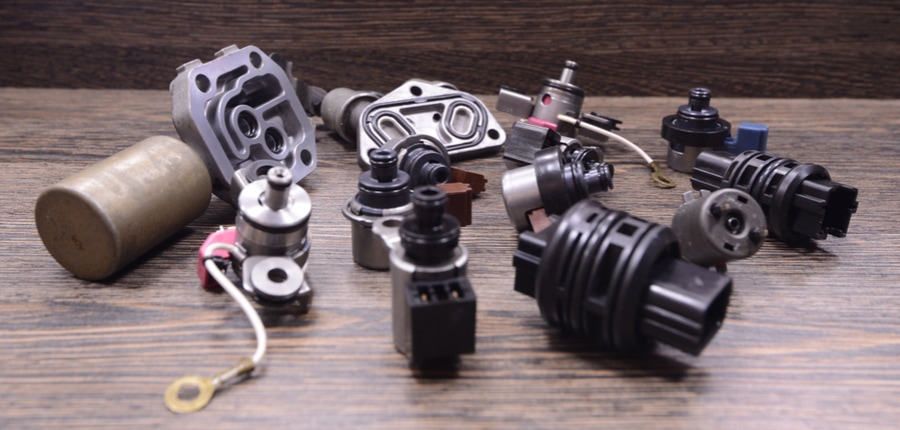In an ordinary automatic transmission, the gears are shifted by valves directing the pressurized transmission fluid to engage different hydraulic clutches.
On newer car transmission designs, the fluid flow is directed by electric solenoids, which are operated by either the Powertrain Control Module (PCM) or the Transmission Control Module (TCM).
On most applications, each solenoid’s operating circuit is monitored, and there is a built-in self-diagnostic capability. So, if a solenoid is not operating as designed, an engine light is triggered.
Costs of Transmission Solenoid Replacement
There is a lot of variety depending on year and model, but a rough estimate of an average cost to replace a transmission solenoid would be about $500.
Some more specific estimates of the solenoid replacement cost using a labor rate of $100 per hour are illustrated below:
- For a 2013 Honda Accord with a 3.5-liter engine
The labor time to replace a shift solenoid is about an hour. There is a solenoid assembly on the valve body, as well as a separate “C” solenoid; all mounted on the top of the transmission housing.
A factory solenoid assembly costs about $614, and a “C” solenoid costs about $154. This makes the job about $714 to replace the solenoid assembly and about $254 to replace solenoid “C”.
- For a 2015 Dodge Dart with a 2.4-liter engine
The labor time to replace a transmission solenoid is 1.4 hours. On this vehicle, the shift solenoids come as a non-serviceable valve body assembly located inside the transmission pan. A factory valve body costs about $1,120. This makes the job cost around $1,280; adding in an average cost for the transmission fluid to be refilled.
- For a 2012 Chevrolet Silverado with a 5.3-liter engine
The labor time to replace a transmission solenoid is 3 hours. The shift solenoids are located on the valve body inside the transmission pan. Availability is limited, even through dealer sources. However, there is a PA Cargo solenoid body assembly available for about $237. The total cost to complete the job would be about $567, which includes the cost of fluid to refill the transmission.
- For a 2010 Hyundai Sonata with a 2.4-liter engine
The labor time to replace a transmission solenoid is about 3.7 hours. The solenoid assembly is located inside an upper transmission cover plate. There are five shift solenoids, and Standard replacements are about $71 each. This makes the replacement of shift solenoid cost about $461, including transmission fluid and gasket.
Related Repairs To Do
Any time the transmission has to be dealt with or opened up, that’s a good time to go ahead and do a transmission service, or at least a drain and fill.
On some transmissions, transmission fluid replacement is unavoidable if there is a lower pan that has to be removed to access the solenoid. While it’s being done, there is also usually an inexpensive transmission filter that is ordinarily replaced, as it has to be removed anyway.
On some other designs that have no transmission pan a drain and fill is usually an additional step. Contaminants or debris in the fluid can contribute to solenoid failure, and it’s a good idea to renew the fluid even if it adds to the cost of the repair.
While the basic diagnostics can be simple due to the self-diagnostic capabilities of the PCM and TCM, usually triggering a code that indicates to some specific shift solenoid failure, sometimes a problem that looks initially like a transmission solenoid can wind up being a problem with the wiring harness to the solenoids instead.
If the solenoids and the wiring are accessible externally, that can be pretty straightforward to diagnose. However, if the solenoids and the wiring are internal, some disassembly is needed in order to determine which is at fault. In the case of the 2015 Dart, for instance, the solenoid wiring harness runs through the inside of the transmission and it’s replacement requires dropping that pan and removing the valve body. So the labor is about the same for the solenoid as it is for the wiring harness, which itself costs about $380 through OE sources.
In many cases, if a code indicates a certain solenoid has failed and the wiring is inaccessible to test, an assumption will be made that the solenoid is at fault and then disassembly is begun. At the point where the wiring harness is accessible, however, best practice is to test both solenoids and wiring to tell for certain which is the problem before continuing.

Transmission Solenoid Replacement
In most cases, replacing a transmission solenoid begins with an engine light and pulling codes, then follows specific diagnostic procedures to verify the problem. Usually, there would be a one-hour diagnostic charge on top of the replacement costs for the part.
Parts availability is spotty in many cases. Some solenoids are replaceable separately but have no aftermarket sources. Some have aftermarket sources but aren’t available through manufacturers except as complete assemblies.
One practice vehicle manufacturers tend to follow sometimes on newer vehicles is to not offer individual parts for sale, only assemblies. So a solenoid failure, even if it can be diagnosed with some certainty, can still wind up being a replacement of the whole valve body or even the whole transmission.
The advantage to the manufacturer isn’t necessarily just selling a more expensive part (as in most cases, this will be done on vehicles under factory warranty), but that they get the old valve body or transmission back and can analyze it for wear. This is useful in refining diagnostic procedures, as well as verifying wear characteristics which can lead to improved durability.
Where parts are available, replacement of a transmission solenoid is sometimes easy. They can be located externally on the transmission housing underneath a cover, or they are located on the transmission valve body, which is usually right inside the lower transmission pan. In the easiest cases the solenoid simply disconnects from the wiring harness and can be unbolted and removed. In other cases the valve body needs to be removed and disassembled on a workbench.
FAQ
Almost always an engine light will be set, even before any problem is noticed in the shifting. Most shops (and some parts stores) can read an engine light and check what the codes mean.
Usually yes, though many shift solenoid problems will put a vehicle into “limp mode” and limit the vehicle’s performance and speed.
Usually not. Whether it is a sticking solenoid or an electrical failure, the self-diagnostics in the TCM programming should prevent harm to the other moving parts in the transmission.

